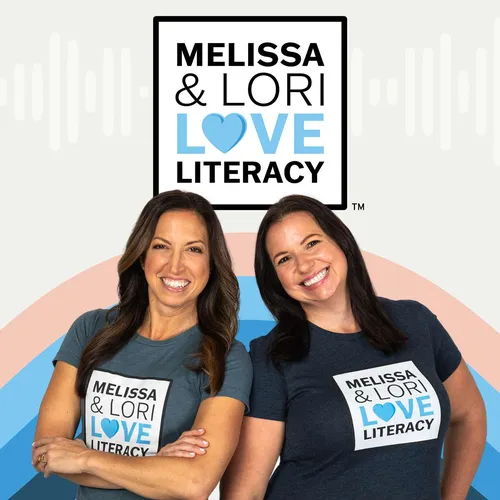
Melissa & Lori Love Literacy ®
Melissa & Lori Love Literacy® is a podcast for teachers. The hosts are your classroom-next-door teacher friends turned podcasters learning with you. Episodes feature top literacy experts and teachers who are putting the science of reading into practice. Melissa & Lori bridge the gap between the latest research and your day-to-day teaching.
- Update frequency
- every 6 days
- Average duration
- 51 minutes
- Episodes
- 317
- Years Active
- 2019 - 2025
![[Listen Again] Ep. 37: Placing Text at the Center of the ELA Classroom with Meredith Liben & Sue Pimentel](https://storage.buzzsprout.com/yvh36kxvt94tzpgqf6e4xpcdsf2w?.jpg)
[Listen Again] Ep. 37: Placing Text at the Center of the ELA Classroom with Meredith Liben & Sue Pimentel
Meredith Liben and Sue Pimentel share the true intentions of t…

Ep. 143: Maximizing Small Group Reading Instruction
Today we’ll be talking to a team of authors about a recent article they published on small group instruction, titled Maximizing Small-Group Reading Instruction. We ask and answer important questions …
![[Listen Again] Ep. 80: A Primary Teacher's Perspective on Science of Reading, Small Group Instruction, and Sound Walls](https://storage.buzzsprout.com/h8yumluoex9yq8i596abhmgb77tz?.jpg)
[Listen Again] Ep. 80: A Primary Teacher's Perspective on Science of Reading, Small Group Instruction, and Sound Walls
In this episode, Lindsay Kemeny, 2nd grade teacher, gives a deep dive into her evidence-based, small group instruction time. Her journey to the science of reading was necessary and life altering. It …

Ep. 142: Structured Literacy in Small Group Time
In today’s episode, we discuss the structure and content of the literacy block. How can we teach using structured literacy in small groups? Kinder teacher Casey Jergens and author Natalie Wexler join…
![[Listen Again] Ep. 22: Leading Urgent Change in Baltimore with Dr. Sonja Santelises](https://storage.buzzsprout.com/ykh32x4np64if2e580lzy761p78v?.jpg)
[Listen Again] Ep. 22: Leading Urgent Change in Baltimore with Dr. Sonja Santelises
Ep. 22: Dr. Sonja Santelises joined us to discuss why she saw the urgent need for change in Baltimore City Public Schools, how she set and supported a clear literacy focus through the Blueprint for S…

Ep. 141: Literacy Leaders as Agents of Change
What does it take to disrupt the "way it has always been done"? Dr. Ernie Ortiz, Senior Literacy Engagement Specialist with AIM Institute for Learning and Research, joins us to discuss this important…
![[Listen Again] Ep 92: Talking About the Literacy Block with Two Early Elementary Teachers](https://storage.buzzsprout.com/afhl0sjl3bhmez5md2yqlqlsdntr?.jpg)
[Listen Again] Ep 92: Talking About the Literacy Block with Two Early Elementary Teachers
We are honored to talk with two early grade veteran teachers from Vista Peak Exploratory in Aurora, CO. Vista Peak is in Year 4 of Great Minds’ Wit & Wisdom ELA, Geodes, and Wilson Language Fundation…

Ep. 140: K-2 Literacy Block Deep Dive
In today’s episode, we talk with a teacher and interventionist from Blount County, TN, Erin Metz. She provides an in depth walkthrough of her district’s K-2 instructional block time. She’ll share her…
![[Listen Again] Episode 10: Noticing The #KnowledgeGap with Natalie Wexler](https://storage.buzzsprout.com/afm4nnye9din4aqzpn9cxks8bmpx?.jpg)
[Listen Again] Episode 10: Noticing The #KnowledgeGap with Natalie Wexler
LISTEN AGAIN | FROM JULY 31, 2019
Today we are live with Natalie Wexler, the author of The Knowledge Gap: The Hidden Cause of America’s Broken Education System–And How to Fix It (LISTENERS - IT’S AVAI…

Ep. 139: Knowledge and Comprehension with Daniel Willingham and Barbara Davidson
In today’s episode, we discuss knowledge and vocabulary as critical components of reading comprehension. We hear from author and professor Daniel Willingham, who shares research on the important role…

2022 COUNTDOWN: #1
Ep. 115: Kindergarten TEAM Reaches (nearly) 100% Success Using Evidence-Based Practices
Kristin Poppens IS BACK! In this episode, she shares the power of teacher teamwork and collaboration. Her Kinde…

2022 COUNTDOWN: #2
Ep. 113: Reading is Rocket Science with Louisa Moats
Why is teaching reading so important? Melissa and Lori have a conversation with Louisa Moats grounded in this article: Teaching Reading is Rocket S…

2022 COUNTDOWN: #3
Ep. 108: From 13% to 100% Literacy Proficiency with School Leader Angie Hanlin
Angie Hanlin, current Superintendent in Wisconsin, led her former school from 13% to 100% reading proficiency. How? Angie…

2022 COUNTDOWN: #4
Ep. 117: The Writing Revolution with Authors Judith Hochman and Natalie Wexler
The Writing Revolution authors, Judith Hochman and Natalie Wexler, share a 'revolutionary' approach to writing. The best …

2022 COUNTDOWN: #5
Ep. 120: Research-Based Routines for Developing Decoding Skills with Julia Lindsey
Talking with Dr. Julia Lindsey is like popping into the classroom next door to chat with your best teacher friend aft…

Melissa and Lori Love 2022: End of Year Wrap Up
Today we’ll be sharing what you can expect for 2023!
We’re so excited to have created such an incredible community of educators who want to learn more about reading and writing. We really mean this. …

Ep. 138: A RISE-ing Cause for Hope
In today’s Feel Good Friday episode, we talk with Shaheer Mustafa, President and CEO of Hopewell Inc, and Amy Schneider, vice president, program impact and strategy at HopeWell. They will share more …

Ep. 137: Tackling the Tough Issue of Adult Illiteracy
In today’s Feel Good Friday episode, we talk with Deidra Mayberry, Executive Director of the nonprofit, Reading to New Heights, which brings attention to adult literacy as a critical issue in our soc…

Ep. 136: An Inside Look at Virtual School
In today's Feel Good Friday episode, we talk with Steven Shadel, Director of Great Minds Virtual School. He tells us about effective virtual learning experiences and how those experiences look very m…

Ep. 135: Decodable Text Series: Math Readability
In this episode, we talk with a team of educators who made Eureka Math Squared decodable, readable, and accessible for all students. As students access math, their deficits in reading can get in the …